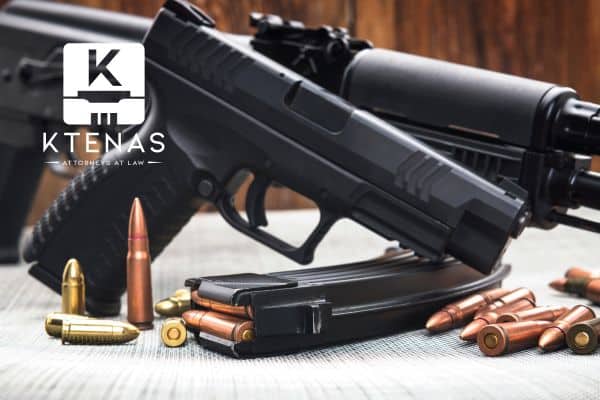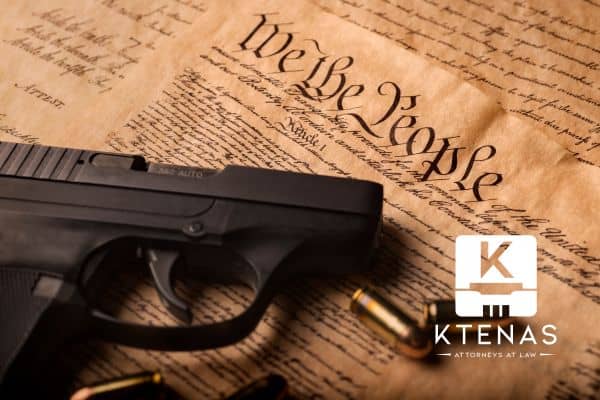Alternative Sentencing Options for Drug Charges in Chicago
2025-04-23T13:15:00
Staying calm and following instructions is crucial if you get pulled over with a gun in Illinois. Keep your hands visible and avoid sudden movements. If possible, leave your windows down until the police come. You have the right to remain silent and only need to provide your license, registration, and proof of insurance.
Firearm owners need to be honest when asked about carrying a concealed firearm. If you have a gun tell the police officer where it is and that it’s unloaded. Never reach for it without permission. Avoid any sudden movements that may seem threatening. In Illinois, the transportation of firearms is legal once you carry an unloaded gun in a firearm-carrying box with a valid FOID card.

If you require a gun charge attorney and are uncertain about your legal entitlements, reach out to Ktenas Law Firm located in Chicago at (312) 756-8652
For Illinois residents, transporting an unloaded firearm in your vehicle requires that you have a valid Illinois Firearm Owners ID (FOID) card. All firearms should be kept unloaded and enclosed in a suitable case while being transported. All ammunition used with the firearm should also be securely stowed away separately from the gun. Furthermore, it is important to remember that knowingly carrying an unconcealed firearm on one’s person or inside a vehicle without a valid FOID card is prohibited.

Non-residents who are properly permitted to possess a firearm in their state can legally bring the weapon into the state of Illinois, though they too must take measures to ensure transport safety by keeping firearms unloaded and stored in a suitable shipping box. No FOID card is required for non-residents in this regard, however, all ammunition must be stored separately from the firearm itself. Additionally, transporting firearms across state lines still carries some regulations mandated by both states involved; before doing so it may be wise to check with legal authorities for any applicable laws or restrictions that apply.
Transporting a loaded concealed carry firearm in a vehicle or on one’s person is something that should be done with the utmost caution and respect for the law. In the State of Illinois, a valid Illinois Concealed Carry License is required to do so. Additionally, it is important to note that there are many locations where concealed carry is prohibited, such as government buildings, public playgrounds, public gatherings, schools, hospitals, and public transportation.
Visitors from other states who have a valid CCL may transport a loaded concealed handgun in their vehicle but cannot remove it. Furthermore, Illinois does not honor concealed carry law permits from other states nor allow open carry of firearms. Non-residents without a CCL should abide by the rules mentioned above when transporting firearms in or through the state of Illinois.
Learn More: How to Beat a Gun Charge in Illinois
Individuals looking to transport their loaded concealed firearms must always stay up to date on the current carrying of firearms laws. Knowing the difference between state and local laws is especially important here because each place might have different regulations regarding firearm laws.
It is important to exercise caution when transporting firearms to avoid unlawful possession charges. Familiarizing oneself with state laws and remaining knowledgeable on the subject can be if you’re ever pulled over with a gun in Illinois.
For Illinois residents, the Illinois Concealed Carry License (CCL) is a great way to ensure they can carry a handgun while visiting 26 other states. To legally carry a concealed handgun in each of these states, individuals must abide by the laws of that particular state. Each state has its own set of rules and regulations when it comes to concealed carry, so CCL holders need to familiarize themselves with the specific requirements for each state they plan to visit.
Illinois also offers non-resident CCLs for those living in Arkansas, Mississippi, Texas, and Virginia who will be spending an extended period within the state. Obtaining an Illinois CCL may take some time and effort but it is well worth it for these individuals if they plan on carrying a handgun while residing in Illinois or make frequent trips between their home state and Illinois during the one-year validity period of their permit. It is ultimately up to visitors whether or not they want to get an Illinois permit; however, if they choose to do so, then they should research their destination ahead of time so that they know what carry of handgun restrictions will apply.
In 2013, Illinois joined the rest of the nation by allowing concealed carry of firearms. However, residents who wish to take advantage of this law must first obtain a permit that requires 16 hours of firearm training. Without a concealed carry permit, those caught carrying firearms are subject to class A misdemeanor felony charges due to Illinois’ strict laws.

Consequently, it is highly advised that any person wishing to legally carry a firearm in Illinois obtain their concealed carry permit to avoid any potential consequences for accidental or unintentional usage of a weapon without proper authorization. Getting the necessary training and permits can be time-consuming but is an important step for taking responsibility as a gun owner in Illinois.
Legally carrying a concealed weapon in Illinois is an invaluable right that provides responsible citizens with the opportunity to ensure their security and safety. Most states allow open or concealed carry, except for certain areas that are seen as sensitive and controversial. These places include educational facilities such as colleges or universities, government buildings like courthouses, hospitals, mental health facilities, public transportation venues, and bars.
Related Content: What gun modifications are illegal in Illinois?
When entering any of these restricted areas while armed with a firearm without prior permission from proper authorities constitutes a serious firearm possession crime. This means that anyone caught carrying a weapon in these locations can be banned from possessing firearms altogether for life or even face jail time depending on the severity of the infraction. Moreover, if any harm comes to any person in a prohibited area due to someone carrying a gun illegally, then criminal record penalties could increase significantly due to penal code violations.
In the event of being stopped with a firearm in Illinois, it is recommended to promptly seek legal representation with an experienced criminal defense lawyer, such as those available at Ktenas Law Firm. Gun laws in Illinois are complex and vary depending on the type of gun being carried and the circumstances surrounding the stop. The Ktenas Law Firm offers legal assistance from experienced gun lawyers who can provide guidance and clarify your rights during the legal process.
It is important to remember that any interaction with law enforcement during a traffic stop involving a firearm can be a serious matter and should not be taken lightly. To secure legal representation for criminal defense in Chicago, Illinois, contact Ktenas Law for further assistance. Our legal team will offer you options to protect your rights as a citizen of the United States.

2025-04-23T13:15:00

2025-04-07T11:50:40

2025-03-24T11:55:03

